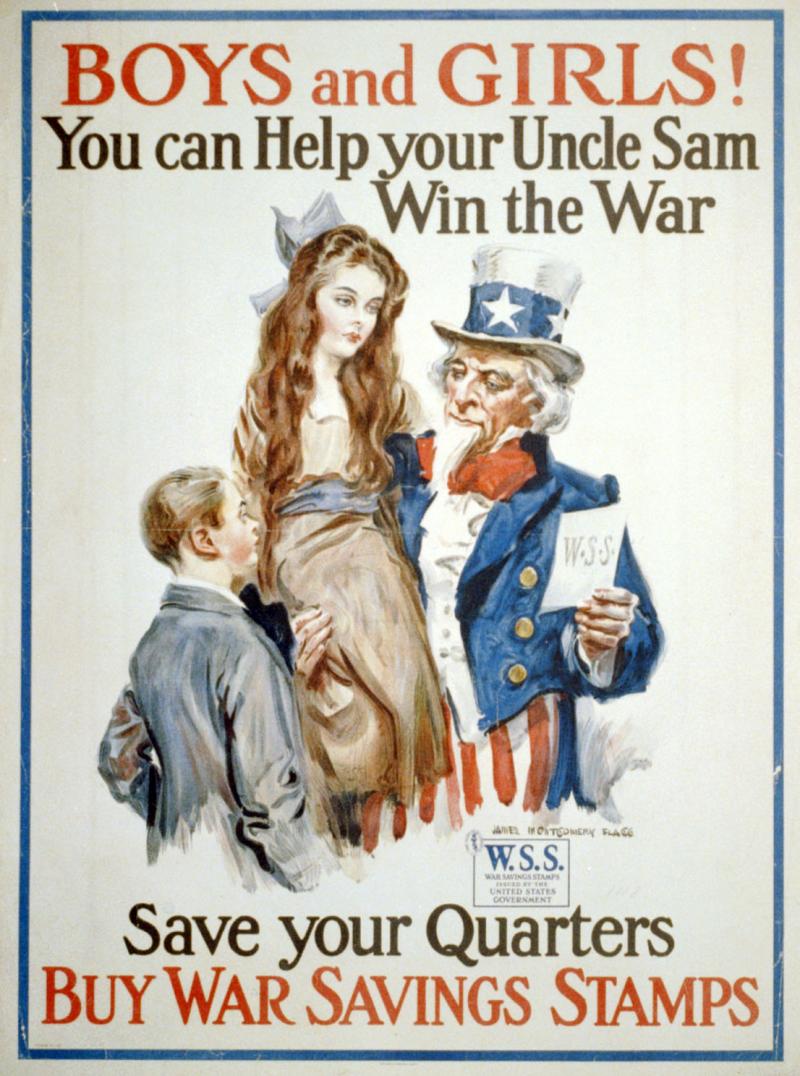Boys and girls! You can help your Uncle Sam win the war
Children couldn’t afford liberty bonds, but to encourage them to support World War I, the government sold war savings stamps, which is in Uncle Sam's left hand, worth 10 cents and 25 cents. Like war bonds, the stamps paid interest. In this poster, Uncle Sam teaches children a lesson not only about patriotism but about the importance of saving. Note how the artist has the boy looking at Uncle Sam, Uncle Sam looking at the boy, and the girl looking at the W.S.S.; this set up keeps the viewer looking between the four subjects and emphasizes the topic of children and patriotism.
For information on war saving stamps go to:
https://postalmuseum.si.edu/symposium2008/Charles-Savings_Stamp_Systems-...
For more on British children and World War I go to:
https://www.bl.uk/world-war-one/articles/childrens-experiences-and-propa...

Flagg, James Montgomery. Boys and girls! You can help your Uncle Sam win the war - save your quarters, buy War Saving Stamps. 1917. Color lithograph. Library of Congress: Prints and Photographs Division. http://hdl.loc.gov/loc.pnp/cph.3b52466 (Accessed December 18, 2018).
Public Domain
Public Domain is a copyright term that is often used when talking about copyright for creative works. Under U.S. copyright law, individual items that are in the public domain are items that are no longer protected by copyright law. This means that you do not need to request permission to re-use, re-publish or even change a copy of the item. Items enter the public domain under U.S. copyright law for a number of reasons: the original copyright may have expired; the item was created by the U.S. Federal Government or other governmental entity that views the things it creates as in the public domain; the work was never protected by copyright for some other reason related to how it was produced (for example, it was a speech that wasn't written down or recorded); or the work doesn't have enough originality to make it eligible for copyright protection.
Add a comment
PLEASE NOTE: NCpedia provides the comments feature as a way for viewers to engage with the resources. Comments are not published until reviewed by NCpedia editors at the State Library of NC, and the editors reserve the right to not publish any comment submitted that is considered inappropriate for this resource. NCpedia will not publish personal contact information in comments, questions, or responses. If you would like a reply by email, note that some email servers, such as public school accounts, are blocked from accepting messages from outside email servers or domains. If you prefer not to leave an email address, check back at your NCpedia comment for a reply. Please allow one business day for replies from NCpedia. Complete guidelines are available at https://ncpedia.org/about.